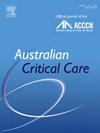The interplay between frailty status and persistent critical illness on the outcomes of patients with critical COVID-19: A population-based retrospective cohort study
IF 2.6
3区 医学
Q2 CRITICAL CARE MEDICINE
引用次数: 0
Abstract
Objectives
Persistent critical illness (PerCI) occurs when the patient's prolonged intensive care unit (ICU) stay results in complications that become the primary drivers of their condition, rather than the initial reason for their admission. Patients with frailty have a higher risk of developing and dying from PerCI. We aimed to investigate the interplay of frailty and PerCI in critically ill patients with COVID-19.
Method
We conducted a retrospective multicentre cohort study including 103 Australian and New Zealand ICUs over the period of January 2020 to December 2021. We included all adult patients with COVID-19 and documented the Clinical Frailty Scale (frail ≥ 5). PerCI is defined as an ICU length of stay of ≥10 days. We aimed to investigate the hospital mortality with and without PerCI across varying degrees of frailty and examined the potential interaction effect between frailty status and PerCI.
Results
The prevalence of PerCI was similar between patients with and without frailty (25.4% vs. 27.9%; p = 0.44). Hospital mortality was higher in patients with PerCI than in those without (28.8% vs. 9.3%; p < 0.001). Mortality in patients with PerCI also increased with increasing frailty (p < 0.001). Frailty independently predicted hospital mortality. When adjusted for Australia and New Zealand risk of death mortality prediction model and sex, the impact of frailty was no different in patients with and without PerCI (odds ratio = 1.30 [95% confidence interval: 1.14–1.49] vs. (odds ratio = 1.46 [95% confidence interval: 1.29–1.64]). Furthermore, increasing frailty did not influence mortality in patients with PerCI more (or less) than in those without PerCI (pinteraction = 0.82).
Conclusions
The presence of frailty independently predicted hospital mortality in patients with PerCI with COVID-19, but the impact of frailty on mortality was no different in those who developed PerCI from those without PerCI.
COVID-19危重症患者的衰弱状态与持续危重症之间的相互作用:一项基于人群的回顾性队列研究。
目的:持续危重症(PerCI)是指患者在重症监护室(ICU)长期住院导致并发症,而这些并发症已成为患者病情的主要驱动因素,而不是患者入院的最初原因。体质虚弱的患者发生 PerCI 和死亡的风险较高。我们旨在研究 COVID-19 重症患者中虚弱与 PerCI 的相互作用:我们在 2020 年 1 月至 2021 年 12 月期间开展了一项回顾性多中心队列研究,其中包括 103 个澳大利亚和新西兰重症监护病房。我们纳入了所有患有 COVID-19 的成年患者,并记录了临床虚弱量表(虚弱≥ 5)。PerCI定义为ICU住院时间≥10天。我们的目的是调查不同虚弱程度患者有无PerCI的住院死亡率,并研究虚弱状态与PerCI之间的潜在交互效应:结果:虚弱和非虚弱患者的 PerCI 患病率相似(25.4% 对 27.9%;P = 0.44)。有 PerCI 的患者的住院死亡率高于无 PerCI 的患者(28.8% 对 9.3%;P=0.82):结论:体弱可独立预测COVID-19 PerCI患者的住院死亡率,但体弱对死亡率的影响在发生PerCI的患者和未发生PerCI的患者中并无差异。
本文章由计算机程序翻译,如有差异,请以英文原文为准。
求助全文
约1分钟内获得全文
求助全文
来源期刊

Australian Critical Care
NURSING-NURSING
CiteScore
4.90
自引率
9.10%
发文量
148
审稿时长
>12 weeks
期刊介绍:
Australian Critical Care is the official journal of the Australian College of Critical Care Nurses (ACCCN). It is a bi-monthly peer-reviewed journal, providing clinically relevant research, reviews and articles of interest to the critical care community. Australian Critical Care publishes peer-reviewed scholarly papers that report research findings, research-based reviews, discussion papers and commentaries which are of interest to an international readership of critical care practitioners, educators, administrators and researchers. Interprofessional articles are welcomed.
 求助内容:
求助内容: 应助结果提醒方式:
应助结果提醒方式:


